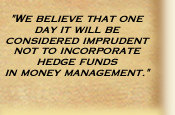|
While allocation of assets in hedge fund is
acceptable for pension plan and other fiduciary trusts, it may result in a
breach of trustee fiduciary duty to invest in hedge funds through a
fund-of-hedge fund (FoHF). Specifically, it may compromise the trust
fiduciary’s duty of delegation and prudence in selecting and monitoring
performance of a service provider, as defined by the Employee Retirement Income
Security Act (ERISA, 1974) and the Uniform Prudent Investor Act (UPIA, 1994).
ERISA and the UPIA have adopted the “prudent
investor” doctrine and created principles in trust asset management which have
led many to conclude that it is imprudent, and not in the best interest of the
beneficiaries, to depart from the “traditional manager direct investment
process” with the use of a consultant. In the case of hedge funds, the
consultant should have a core competency in hedge fund evaluation, portfolio
construction, and manager monitoring. The hedge fund consultant would conduct
its relationship with the trust fiduciary in the same manner a “traditional
consultant” would for long only manager investments. Furthermore, it is the
opinion of this author that exercising a trust fiduciary’s obligation to
delegate does not mitigate fiduciary liability in several areas.
While trust fiduciaries that use FoHF
satisfy the “obligation to delegate” (UPIA, section 9), FoHF fall short and may
create potential fiduciary risk in the following areas:
-
Ability to establish the scope and
terms of the delegation “consistent” with the trust objectives;1
-
Ability to ensure ongoing “compliance” of
investments to Plan documents; 1
-
Ability to influence the investment process
(asset allocation, manager selection, etc.) when “scope and terms of the
delegation” are not being met; 1
-
Ability to perform “prudent,” ongoing monitoring;
2
-
Duty to become familiar with hedge funds in order
to improve ongoing monitoring; 2
-
Duty to “know and inquire” about the nature of
their manager’s investments; 2
-
“Trustees are obliged to minimize
cost;” 3
-
Avoidance of unnecessary
counter-party risk resulting from an investment in a FoHF (i.e., financial
stability of General Partner of FoHF, use of leverage by General Partner,
potential increase in valuation risk); 1, 2
-
Ability to represent itself and
take direct and immediate legal action against a hedge fund manager within the
FoHF;
-
Ability to participate in class
action law suits against stocks held in the portfolio of a hedge fund manager
within the FoHF.
Elimination of Restrictions on Investments
All restrictions on investments (including hedge
funds) were eliminated by ERISA and UPIA when the “prudent investor” rule was
adopted.4
The UPIA states, “The trustee can invest in
anything that plays an appropriate role in achieving the risk/return
objectives of the trust.”5
Duty of Delegation
According to UPIA and ERISA, fiduciaries are
“obligated to delegate” their investment management duties if they do not
possess the requisite knowledge and expertise. In United States v. Mason
Tenders (S.D.N.Y, 1988), the court held that “where the trustees lack the
requisite knowledge, experience and expertise to make necessary decisions with
respect to investments, their fiduciary obligations require them to hire
independent outside advisors.”6
However, the duty to delegate imposes two key
responsibilities that present potential risks to trust fiduciaries when using a
FoHF.
The Duty of Due Diligence
When investment management responsibilities are
delegated, “The trustee shall exercise reasonable care, skill and caution in .
. . selecting an agent . . . [and] establishing the scope and terms of the
delegation, consistent with the purposes and terms of the trust.”1
Accordingly, Whitfield v. Cohen found a trust fiduciary liable because
the fiduciary “did not know nor inquire as to the nature of the investments”
made on behalf of the plan.2 When investing directly in hedge funds,
the act of knowing and inquiring is a functional part of the trustee’s
investment process. This is not the case when trustees invest in FoHF.
Many FoHF invested in Long-Term
Capital Management (LTCM). As with all who invested in LTCM, the FoHF general
partner “did not know nor could it inquire as to the nature of the manager’s
(LTCM) investments.” Consequently, the trust fiduciaries who invested in that
FoHF may have breached their duty of due diligence by inadvertently investing in
LTCM through the FoHF. Furthermore, it is extremely unlikely that trust
fiduciaries (or their consultants) would have chosen to make a direct investment
in LTCM for obvious reasons (i.e., lack of transparency and excessive
leverage). Nonetheless, FoHFs took advantage of an opportunity to invest in
LTCM to improve the “performance” profile of their FoHF without the transparency
needed to explain how such “performance” was achieved.
|
 |
Furthermore, a
FoHF investment in LTCM was often used by the FoHF to attract new investor
capital since many investors could only get exposure to LTCM through a FoHF.
Realizing the high investor demand for LTCM, those FoHF who had LTCM exposure
marketed their product with an emphasis on the inaccessibility of LTCM to
outside investors. This resulted in one of several conflicts between the
objectives of a trust fiduciary and that of the FoHF. The objective of a trust
fiduciary has nothing to do with FoHF product marketing, yet fiduciaries become
bystanders to the capital gathering mission of
FoHF. Consequently, the FoHF investment can cause
a trust to be invested in hedge fund managers that are “not compatible with the
terms of their trust” (i.e. LTCM, transparency, leverage, etc.). 1
Direct investing in hedge funds
by the trust greatly improves the ability of the trustee to verify compliance
to their trust plan. Direct investing also reduces risk to trust fiduciaries
and avoids the potential for conflicts of interest between the trust plan
investment policies and the FoHF investments in hedge funds that may not be in
compliance.
The Duty to Monitor
Once the duty of due diligence
has been completed, the trust fiduciary has an ongoing duty to monitor the
performance of the selected investment manager and periodically review the
agent’s actions in order “to ensure compliance with the terms and scope of the
delegation.”1 This can be extremely difficult for a fiduciary
invested in a FoHF. In many cases it can be impossible due to insufficient
transparency of most FoHF.
“The duty to monitor carries
with it, of course, the duty to take action upon discovery that the appointed
[managers] are not performing properly.”7 Whitfield v.
Cohen (S.D.N.Y. 1988) emphasizes this ongoing responsibility of fiduciaries
by finding that “the fiduciary had a duty…to withdraw the investment if it
became clear or should have become clear that the investment was no longer
proper for the Plan.”2
A FoHF investment in LTCM (or
any other manager with similar issues in transparency and leverage) may present
a risk to the fiduciary’s duty to monitor, which is substantially mitigated, but
not entirely eliminated, by direct investing in hedge funds. One could make the
argument that monitoring the performance of a FoHF, but not being able to ensure
“compliance with the terms and scope of the delegation”1 at the hedge
fund manager level, is insufficient given the spirit of trustee responsibility
and accountability.
Conclusion
It is clear to many that direct
investing and direct involvement in the investment process at the hedge fund
manager level (not the FoHF General Partner level) is more in line with
established and proven practices currently in place for the “traditional long
only” manager investments made by trust fiduciaries. Hedge fund investment
consultants can be retained to make direct investments in hedge funds using a
process similar to that of “traditional investment consultants” who are retained
to make direct investments in long only bond and equity managers.
Essential to the issue is the belief that direct
investing in hedge funds better reflects what the beneficiaries of the trust
expect from their trust fiduciaries. Beneficiaries may consider indirect
investment in hedge funds through FoHF as imprudent and the least cost-effective
option for trust fiduciaries. A case can be made that investments in a FoHF
(although in compliance with UPIA’s “obligation to delegate”) is not
sufficiently transparent to trust fiduciaries and is ultimately delegation with
abdication of fiduciary duty. Recent case history has put to question whether
fiduciaries can delegate both responsibility and accountability and remove
themselves from regulatory scrutiny and personal liability.
[1] UPIA, Section 9 (a)(1), (2)
2
Whitfield v. Cohen, 682 F.Supp 188 (S.D.N.Y., 1988)
3
UPIA, Section 7
4
The Restatement (3rd) of Trusts, Prudent Investor Rule
5
UPIA, Section 2 (e)
6 United States v. Mason Tenders (S.D.N.Y.,
1988)
7 Liss v. Smith, 991 F.Supp 278 (S.D.N.Y.,
1998)
Charles J. Gradante is managing principal of Hennessee Group LLC, New York, a consultant to hedge-fund investors. Parsa Kiai, a Hennessee associate, contributed to this article. |












